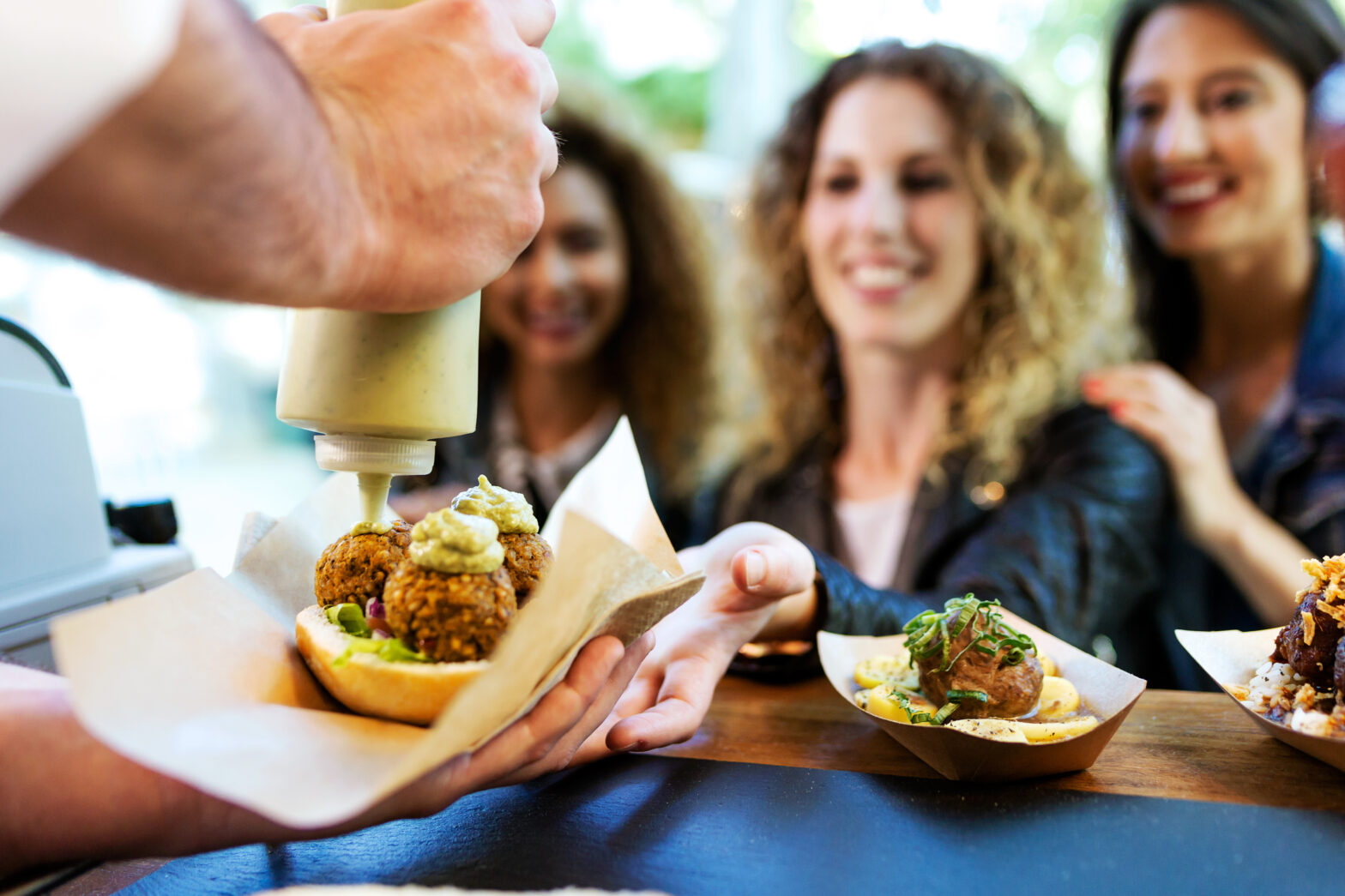Over the past few years, food trucks have exploded in popularity. From local parks, city centres, and even Food Channel shows, one thing is for sure; everybody loves a food truck business. They’re fast, creative, and usually a lot cheaper than going to a fancy sit-down restaurant.
For chefs and cooks, food trucks open up a whole new realm of creativity. You can have full control of the menu, without having to report to the usual restaurant hierarchy. The only thing that you have to worry about is keeping your customers loyal, satisfied, and interested.
As wonderful as all of this sounds, however, many aspiring chefs fail to realise the costs associated with opening their first food truck. When you’re looking at how much to start a food truck business, you need to consider costs of the truck, cooking equipment, renting locations, and even advertising. If you want to be successful, then you need to treat your truck like a business.
John Martin started Spectacular Goat Food Emporium 5 1/2 years ago, having spent 18 months learning about making bread and pizza.
‘I had a passion for food and the main drive for me was the look of joy on someone’s face when they took a bite of something delicious,’ he says.
After a year of friends saying they loved his food, Martin thought there could be an opportunity to turn his hobby into a business. He built a realistic budget based on what we could afford to invest and worked from there.
He decided that pizza was the path to take, and that a wood-fired oven was the best way to create a great product. ‘If I couldn’t create something special I didn’t want to bother,’ Martin says. ‘That paid off for me; within six months I was booked up for the following summer and looking for a second setup.’
That was a 1950s caravan, which Martin added to 12 months later with a 1960s VW pickup.
Small Business Pro is the ideal tool for you when you’re starting your business. It will help with the heavy lifting of managing customers, taking payments, insurance, finance and HR, plus you’ll get a host of personal wellbeing benefits.
You can find out more about Small Business Pro here.
Finding the right truck or van
If you’ve got the budget, a van makes life easier, Martin says – but the right ones can come at a cost. ‘The vans people want are the vintage ones; Citroen H Van is the king of UK Street food, but you’re looking at around £45,000 (plus fit-out of kit) to get something that gives you some space and is mechanically sound,’ he says.
With one of these, the ‘street food elite’ will consider you for their events and you’ll get plenty of wedding work if that’s what you want, Martin adds. ‘Even then consider how far you want to travel; they are notoriously unreliable and slow.’
One other option is to explore second-hand vehicles. On E-bay for example, there are fitted out Citroen H Vans and VW Camper vans going in the region of £15,000 to £20,000. Of course, you’ll need to factor in any refurbishments and possibly mechanical work into these prices before you’re ready to hit the road.
If you are thinking about festivals and bigger events, consider whether a van is what you need. ‘You can invest your money in pitch fees and run from a gazebo! A modern van will cost you £30-40,000 depending on the food type you want to serve. If your food is outstanding you’ll get business, even if it’s average and you’re prepared to travel you’ll find work.’
Martin’s budget couldn’t stretch to either of these vans, so he opted for a gazebo and an oven on a trailer that he could tow with his car. He splashed out on the oven and trailer and invested around £10,000 into his setup, with the trailer offering suitable capacity for most of what he needed, and the car taking the rest of the kit and the food.
Buying equipment
Where you are trading and how you trade are as key, as is what you want to sell. Martin decided on a wood-fired oven, which he expected to contribute to the quality of the food. ‘I know other pizza guys who have gone electric, because they were chasing indoor exhibition hall work, which can be profitable if you can deliver the volume and get your costs under control,’ Martin says. However, the venue will want at least 30 per cent of turnover, he adds.
If you’re planning to sell burgers and fries you’ll need a griddle and a deep fat fryer. Cooking outside means heat will dissipates quickly, so you’ll need a high-powered electric griddle, which means a big power supply or gas – more expensive to buy initially. Your deep fat fryers will also need big power, Martin says, as you’ll lose business if you can’t cook your food in a reasonable time. Buying cheap is always tempting, but this is the key area to delivering profit.
Location, Location, Location
Where to trade? On the street; you’ll need a licence from your local council – you can’t just set up where you want.
Consider the footfall in the area and whether you are planning on being there every day or just whenever you can. ‘People like to know you’re there every day and the temptation to not bother when the weather is bad or if you’ve got something else on will quickly diminish your regular trade,’ Martin says.
He also advises to check out your markets and see if they have the kind of traders that attract people who might try your type and quality of food.
Local markets don’t need a licence, but you will still need to be registered with your local Environmental Health Officer. ‘It can be a great place to learn your trade, you’ll tend to be ticking over so you can see where the problems may be when you get busy,’ Martin says.
A great street event can make you good money and bring in other opportunities. They’ll take a cut and a fee, but you should have a ready-made customer base. Festivals usually involve a big outlay up front and are booked up to 12 months in advance. ‘There are no guarantees and you can lose big as well as win big,’ Martin says. ‘Approach with caution!’
Martin opted for local markets, found some local events and then some street food events before focussing on weddings, corporate events and a few street food events when time allows. Low risk, good exposure and profitable enough if you manage your costs well.
If you’re prepared to travel to find customers there are a number of apps and online platforms to help mobile caterers find trading pitches. examples include:
- Street Food – A street food events company that operates throughout the UK. It has its own App for booking services and covers markets, festivals, pop-up locations and permanent pitch locations.
- StreetDots – Connects landowners/event organisers and street traders together with an online booking system. It also provides a vetting service so both sides can be assured of the business potential in any agreement.
- Feast It – An online booking platform for people searching for events catering. If you can get onto the vetted listed of suppliers then you can have the opportunity to get matched up to organisers of festivals, street fairs, outdoor parties etc.
- NCASS Mobile Catering – As part of their Membership package you get access to a ‘Work Opportunities’ board.
- Kerb Food – London-based, it acts as a kind of collective for street food vendors and arranges pitches for them. It also acts as an incubator for new businesses, as a food hall operator, and as an event caterer.
Final thoughts
Find your passion in food, whether it’s pizza, burgers, BBQ or something totally unique. ‘Your passion will shine through and customers love that,’ Martin says.
Once you know what food you want to specialise in perfect your product and technique and practise on your friends and family, he advises. Once you have that, decide what will work best on the street and what kit you’ll need to succeed.
‘Then set up and test again (build a list of kit and bits you need so you have a check list) once you know it works with friends and family find a good market and test it for a few weeks and build up a reputation and feedback that you can use to help get bigger events in your chosen market place.’
Further Resources on Street Food
Here are some useful sources of information if the above has sparked your interest in starting a food truck business.
- The Food People Infographics – Food and beverage trends and statistics presented in highly engageable graphic formats. Get the low-down on the latest popular cuisines and ‘flavour markers’.
- StreetFood.org.uk – A site put together by the NCASS that is chock-full of information for anyone interested in starting up a street food business in the UK.
- StreetFood Live – An annual B2B event for the street food industry and mobile caterers. Ideal for traders to source products and services, find out the latest innovations in equipment, get marketing advice and free consultations, as well as network with fellow food entrepreneurs.
- The UK’s Appetite For Food Vans – Unwrapped – A collection of interesting data on the most popular foods and menus being served from food trucks.





